#the hero's journey
Text






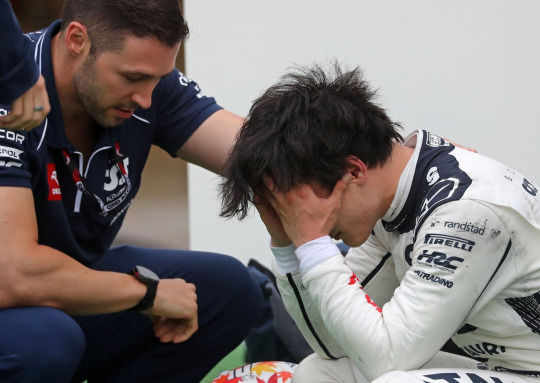
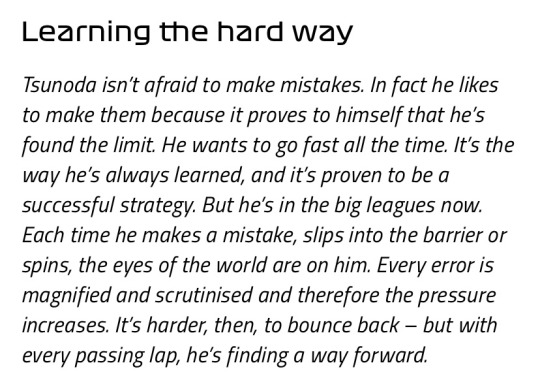


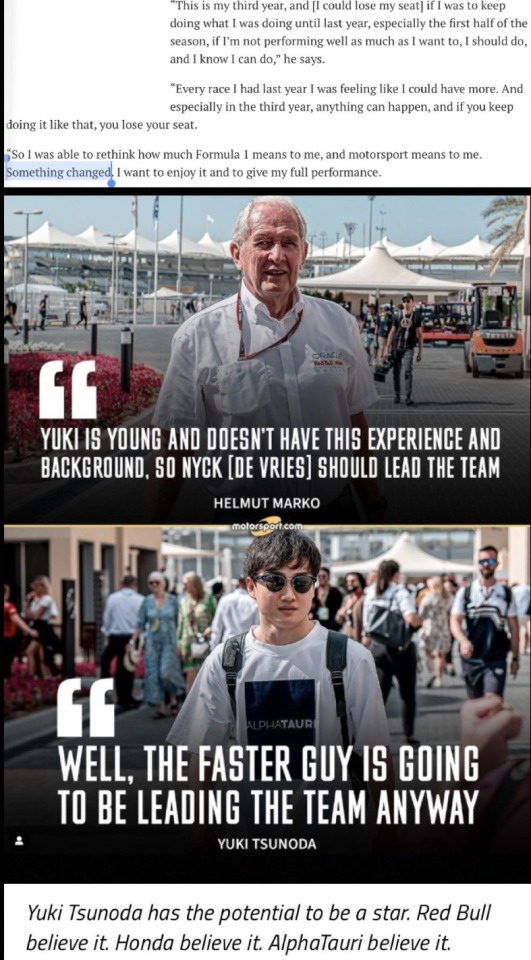
yuki tsunoda's formula one career so far // the hero’s journey (myth and the movies, by stuart voytilla)
#a yuki narrative without food or how short he is or a Frenchman?!!!😱#he's being forged in the fires of redbull and the psychological torment of that old man corpse to be groomed into the rbr second seat#I see the vision#his consistent p11 performances pulling a car that absolutely isn't 6th fastest is quite a feat#web weaving#the hero's journey#my edits#yuki tsunoda
605 notes
·
View notes
Text
Here are the stages of grief for belated Destiel fans (I've lived them, I'm still in recover).
1. The downplay: here people acknowledge the existence of Destiel but also think old-time fans exaggerate it. Bear in mind: usually these people have never watched Supernatural before so this can also be called "The blissful ignorance" stage.
2. The curiosity; Usually on Tiktok and usually around Nov 5th, said people get bombared by Destiel-related content. The lingering angst of the fans start to tingle the blissful ignorant's curiosity.
3. The warning: Wise and longstanding fans warn said people against watching SPN. They really do their best, in hindsight one can say that they really cared about newcomers. They scream ZONT ZONT ZO IT at the top of their lungs.
4. The arrogance: said people ignore the wise fans' warnings and proceed to watch SPN thinking they're stronger than anybody and they indeed will AND can ZO IT.
5. The suspect: season 1 starts before said people's eyes and they soon realize Dean is bi-coded and "omg it's so obvious". People start to suspect fans were ALWAYS right.
6. The shock: few episodes in season 4 and now said people are the ones who are screaming. They can't believe their eyes, they repent, they apologize, they BELIEVE.
7. The rage: they get angry at the show for gasliting people for 15 years while still watching it because they need MORE.
8. The doubt: people start looking for old online metas because maybe they're getting crazy so they need proofs, receipts, timestamps etc.
9. The certainty: people are now certain even though the show never gave them any certainty. But now they know that "when you know, you know".
10. The consolation: the only thing left to do is watching edits, gifs, other people' comments. Usually these people are never left alone and will be in good company while recovering from the TRAUMA.
TELL ME I DIDN'T SPEAK THE WORD OF GOD NOW!
#destiel#dean winchester#castiel#spn castiel#supernatural#spn#New destiel fans#the hero's journey#dean and cas#deancas#nov 5 2020#nov 5th#dean x castiel
75 notes
·
View notes
Text
Long ass post incoming: I'm fascinated by the idea of a victorious villain's narrative. It's an exceedingly rare thing. Ostensibly villainous narratives usually either dilute the evil by twisting themselves into knots to make the villain protagonist justified or empathetic. I never liked the idea that stories are meant to have morals. Ever since I was a child, I always thought the theme was enough. I found fascination in the idea that the wicked have their own untold stories that people are too afraid to write. There's so little material detailing the victory of evil characters that there is no template. There's no inverted monomyth, no long-standing pattern of The Villain's Journey, and that fascinates me. It's wide open for creative exploration. What would it look like?
A good villain must be formidable against the hero. The dark lord in his tower. But what was the climb to the top of that tower like? Why did they do it? What did they feel? Was there pride? Ambition? Fear, and the courage to overcome it? I think there are blind spots in telling this kind of story, because writers erroneously try to justify the motives of a character unconcerned with justice. They don't have to bother with that. Liberated from this, you can tell something much more raw and unconstrained.
Morality is much more malleable than most people are comfortable admitting. What is considered righteous is usually bound to a changing (and often politically influenced) service to whatever social order keeps people feeling safe. The lines we draw are more arbitrary than we want to think. Shifting perspective can move the line between a cruel invader and a brave explorer, a selfish usurper and a righteous rebel, a dangerous outcast and a fascinating renegade, a ruthless savage and an admirable survivor.
I think a good villain story doesn't come from trying to blur or move that line, but to just look away from it. To not care, to not worry if the audience is going to hate or romanticize the character and instead just tell the story and let it be what it is.
I feel like I intended a stronger point, I might revisit this later. Anyway I've been cooking up a villain story for a while. I want to write a character that openly hates, who regrets their acts of kindness and generosity, who stops caring about good and only sees their goal. Their antagonist will not be another, worse villain. Their antagonist will be a righteous person from the point of view of everyone except our evil protagonist. There won't be a downfall where they are punished, only a dark tower and the steep climb into its throne.
#escaped audios#writer thoughts#tropes#the hero's journey#evil protagonists#villains#villain protagonist#audio roleplay
38 notes
·
View notes
Text
Explaining WillEl's Narrative Duality— With Charts!
Today I want to talk about the duality of Will and El's storylines and how paralleled the two are, and to help explain I've drawn little diagrams! (or, me forcing everyone try and read my handwriting)
This will probably be a multi-part post, but I'm going to start with season one since it is the easiest to explain, but also looking at just season one gives a good incite into where their individual arcs are heading.
First, let's start with the narrative backbone— Joseph Campbell's Hero's Journey
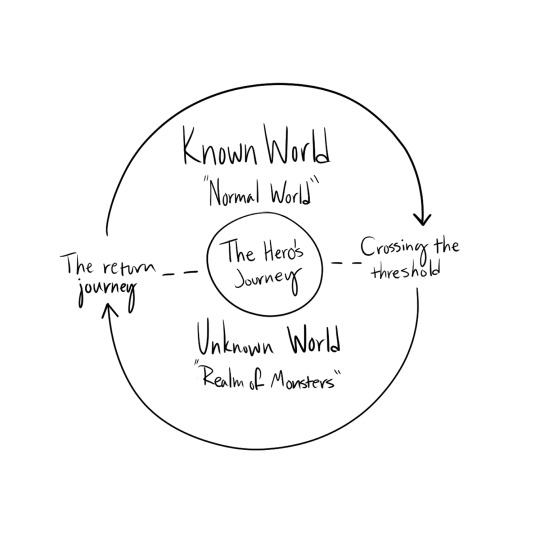
The Hero's Journey is literary cycle that Joseph Campbell proposed all stories follow. Now whether or not all stories follow it is debatable, but ST actually follows it to a T.
I've simplified it for the sake of this post, but the general gist of it is that the hero starts off in the Known World, or the "Normal World," and then "crosses the threshold" into the Unknown World, or the "Realm of Monsters" as I'm calling it on my little chart. The hero then ends the cycle when they make the return journey back to the Known World with the knowledge they have gained.
Pre-season one, El and Will are sitting on opposite ends of the chart, Will lives in the Known World and El lives in the Unknown World. This will make more sense as I continue explaining.

I guess it's important to note that parts of the Hero's Journey is meant to be transformative based on the work and character that it is applied to. The Unknown World here is the known world to El, but from an audiences perspective her world is the unknown one, thus why I've placed her on that side of the chart. Will and El both follow the same steps of the chart in the same order, but whether they are in the Normal World or Realm of Monsters is different.
Once season one begins and we have our inciting incident, both characters cross the threshold onto the other side of the chart. They basically switch sides. El escapes the lab entering the Normal World and Will is taken to the Upside Down, or the "Realm of Monsters"
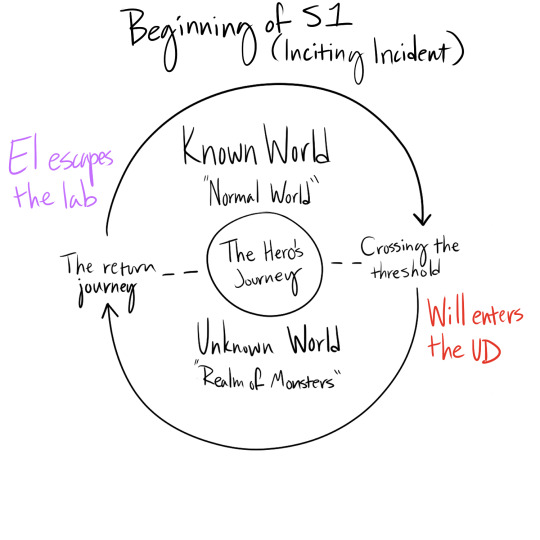
We see a lot more of El's story then we do with Will's, but for most of the season Will and El are basically living out opposite arcs. I think if you consider Will having powers, this is especially true.

El is a girl with powers who is learning how to navigate the conventions of the normal world.
Will is a normal boy who is learning how to navigate his powers in the unknown world.
If El is going to survive in this new environment, she has to learn how to dress and act like a normal girl. She has to learn what normal girls wear and what a friend is and how to make promises, all things that kids in the Known World, like Will, are already familiar with. On the other side of this chart, if Will is going to survive his new environment he has to learn how to use his powers. He has to learn how to control the lights so that he can communicate with his mom, something that kids in the Known World would not know, but that kids from the Unknown World, like El, would know.
The climax of season one is when their respective "monsters" are closing in on them. The Demogorgon (Vecna) gets closer to Will and Brenner gets closer to finding El.

Will and El then end the season on opposite ends of the chart once again, having both made their return journey.
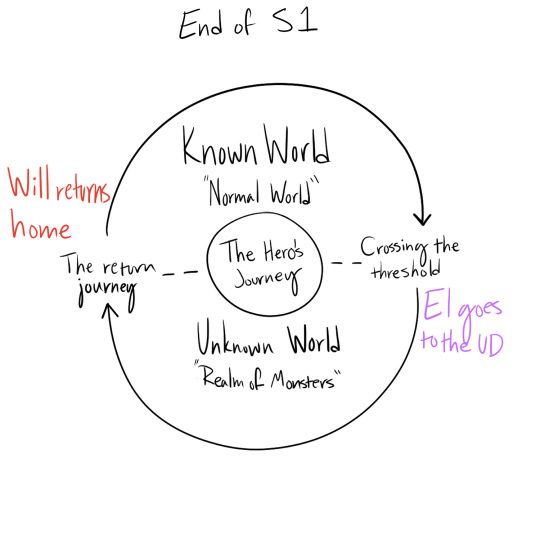
(Of course, the story doesn't end there, but this is the resolution that is offered for the first season)
Like I suggested towards the beginning of this post, I feel like examining their respective storylines in this way could help predict the projection of their arcs in season 5, and what the core of their arcs are actually about.
An important aspect of The Hero's Journey that I didn't illustrate on my little chart is "Master of Both Worlds" or the step toward the end where the hero is a master of both the Known World and the Unknown World. This is a step that we haven't quite seen yet with neither Will nor El.
This goes along with my post here where I speculate the conclusion of Will and El's arcs, which includes El becoming her own person outside of being a superhero and Will becomes the chosen one. Considering that Will started off in the Known World and El started off in the Unknown World, the goal for each character has to be about mastering the opposite realm. Will is likely going to become a master of the Upside Down and his powers, and El is going to come into her own person outside of her superhero identity.
#willel#stranger things#stranger things 1#stranger things analysis#the hero's journey#my analysis#will byers#el hopper#i feel like i just barely scratched the surface with this#their narrative duality is so much more than just this#but i wanted to keep this short and just introduce this concept#but will likely be using this as a backbone for other posts in the future#and expanding on it#will byers has powers
160 notes
·
View notes
Text

Hey all! Wanna read my patreon only comic, You are the Chosen One? It's about 23 kids that get the same prophecy dream. It was on a short break while I finished another job, but I've posted pdfs of the story so far for easy reading. Nows a great time to catch up! It's just a $1 a month.
https://www.patreon.com/posts/you-are-chosen-76274291
194 notes
·
View notes
Text
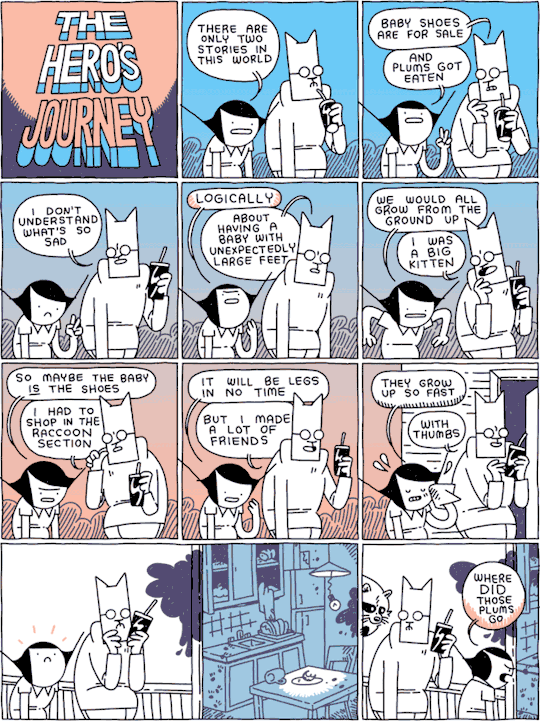
So cold and so feet
14 notes
·
View notes
Text
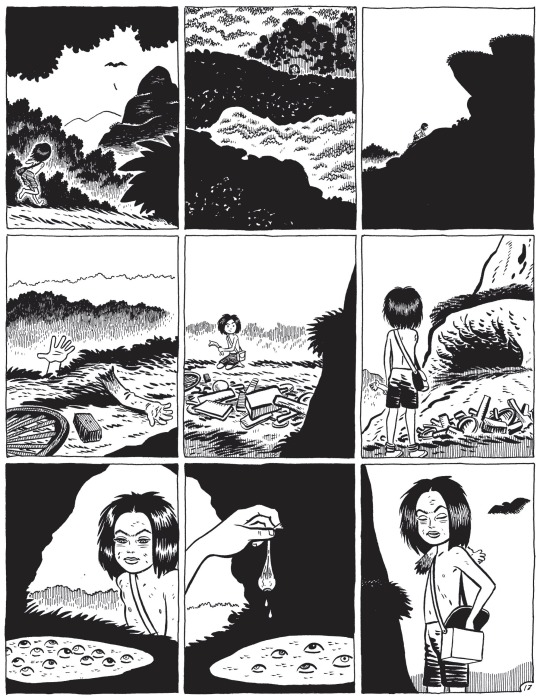
"The Hero's Journey"
Human Diastrophism (2007)
Gilbert Hernandez
Fantagraphics Books
#Human Diastrophism#Love & Rockets#Gilbert Hernandez#Fantagraphics Books#Great Comics#Great Comic Art#The Hero's Journey
8 notes
·
View notes
Text
Scott Was Never the Hero
Incoming Rant: Re-watching the first season of TW I have realised why I never felt that Scott was The Hero of the story even if the writers did not stop hammering the idea that he was pure and perfect and always right. He never sacrifices himself. This is a classic of fiction, the hero will always be the one who makes the greatest sacrifices for the common good and for those they love, renouncing happiness, normality and even their own life.
But Scott never does that. Even in the first season this is very clear. The first few episodes emphasise that playing lacrosse and dating Allison are things he wants, but are dangerous to himself and those around him. The narratively logical thing would be that, after a period of selfish refusal, he would realise that the right thing to do is to give up what he loves until he has better control of himself and his new powers, sacrificing his temporary happiness for the good of others.
Instead, the narrative rewards Scott with control gained through Deux Ex Machina and not hard work, he gets to date Allison and becomes a Lacrosse star without sacrifices and therefore doesn't grow or evolve at all. This keeps up for all 6 seasons. Meanwhile, everyone else around him is constantly sacrificing their safety, sanity and even life for the common good.
And ten years later in the movie nothing has changed. Scott’s still not the one performing the sacrifice, he's still not the hero yet. He gives nothing, but the narrative rewards him with true love. Meanwhile Derek gives his own life to save those he loves he is The Hero.
My reply to all of this?
Pretty much everyone else in Teen Wolf has been a hero in the show, and it has never been Scott.
We have so many other characters sacrifice and give up so much of themselves to Scott’s crusade, and to his illusion of power as a proverbial “True Alpha” (I throw up in the back of my throat just writing it), and we never see any of it acknowledged by anybody, let alone Scott.
As I have rewatched the series, it is glaringly obvious that Stiles is the true main character of the show. He is the one who pushes the narrative the most, he is the one who digs for the information when no one else will. He drove the entire narrative of finding out the truth about Derek’s past, about Malia’s past, about Kira’s past, and even about Theo (god, I hate his character, too).
Scott's actions throughout the years are completely performative and nearly always in his own self-interest. He coerces, guilts, and emotionally manipulates his "friends" throughout the show all in some perverse power play.
Derek, on the other hand, risks his life over and over again for not only his pack, but for Scott, too. Derek was willing to die for his pack, whereas Scott couldn’t even be inconvenienced by them getting kidnapped, assuming that they were already dead and not even wanting to go after them. Derek not only put his life on the line for his pack time and time again, but he also chose each one of them and gave them the option to say no to the bite. He made it appealing, yes...but he still gave them a choice. Scott never did.
Scott has never been the hero.
Ever.
#npheq ask and answer#teen wolf#teen wolf meta#the hero's journey#scott mccall is a bad friend#scott mccall bashing
50 notes
·
View notes
Text
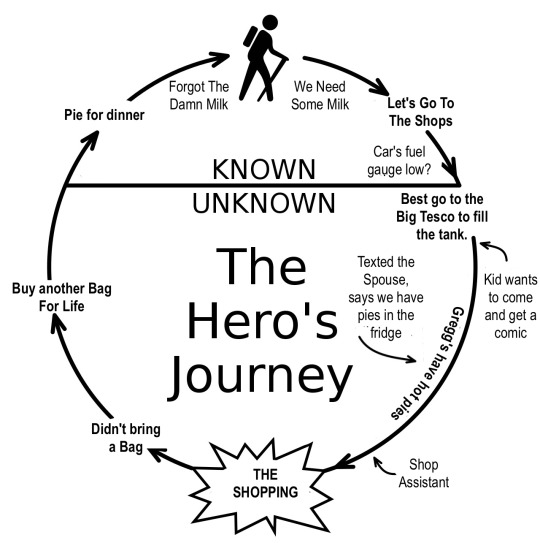
7 notes
·
View notes
Text
Puss In Boot’s Hero’s Journey
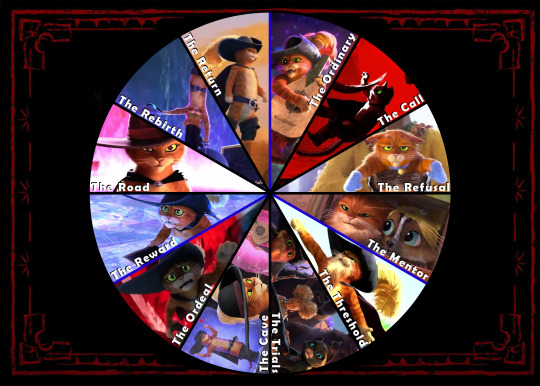
I made this while avoiding my homework because my class sucks and I hate it and I need a distraction so here’s a diagram highlighting the Hero’s Journey found in Puss In Boots: The Last Wish
I wanted to cover this in a YouTube analysis but I don’t have the time to do one of those, so instead I’ll just provide a quick explanation of each stage under the cut
Don’t ask about the blue lines, I’m saving that explanation for an actual video essay, just know it helps keep me organized
The Ordinary World - This is the stage that introduces the hero and their world, and in Puss’s case his world is one where he is a legendary hero beloved by all.
The Call to Adventure - This is the stage that begins the hero’s journey, often initiated when the hero faces new responsibilities. You could argue this stage begins immediately once Puss gets hit by the bell, but I like to think that his first fight against Death is when he’s truly forced to take responsibility over his own life.
The Refusal of the Call - No one likes having responsibilities thrust upon their shoulders, so the hero remains reluctant to leave the comfort of their ordinary world. This stage begins when Puss flees from Death, avoiding any further adventure as he enters retirement.
Meeting the Mentor - Mentor characters come in all shapes and sizes, and their primary purpose is to convince the hero to accept their responsibility and guide them into the unknown. I like to think that both Death and Perrito serve this role, which is self-explanatory.
Crossing the Threshold - This is the stage where the hero faces their first adversary, officially exiting the ordinary world. I consider Goldilocks and the Three Bears the threshold guardians in this case as they instigate Puss’s quest to regain his lives.
Tests, Allies, and Enemies - This stage represents the bulk of the hero’s journey as it contains every test, ally, and enemy the hero faces (I called this stage “The Trials” in the diagram for simplicity). Kitty Softpaws, Jack Horner, and the rest of the supporting cast are introduced here, each playing a different role in Puss’s development (which I’m not gonna specify right now).
Approach the Innermost Cave - This stage begins when the hero faces the main obstacle of their journey, and is often referred to as a trip to The Underworld. This movie does my job for me by portraying this stage in a literal cave with literal Death making an appearance.
The Ordeal - This stage is often confused for the climax. It’s not, stop doing that, it makes me so mad when people do that.* This is when the hero faces the central conflict of the story and finds themself in a moment of rebirth. Puss once again is face to face with Death and once again chooses to flee, and his moment of rebirth is not one of confidence gained but confidence lost. He abandons his friends for the wish because the ordeal caused fear to overtake him.
The Reward - This stage is often confused for the falling action. It’s not, stop doing that, it makes me so mad when people do that.* This is when the hero is cursed upon retrieving their goal, leading them down a final road of trials (I personally like to think of it as pulling a legendary sword from a stone and then the stone suddenly starts spewing demons everywhere). Puss’s reward is the wish, but upon seizing it he loses the trust of his allies and gains the wrath of his enemies.
The Road Back - This stage is often confused for the epilogue. You already know by now that this isn’t the case, for this is actually the final conflict the hero faces before the climax. For Puss, this is his final fight with Death, his final trial and his return to the ordinary world. He has regained his confidence and heroic demeanor, but has also been changed by his journey into a more humble and strategic fighter. Death acknowledges this change, and thus the final trial ends with his departure.
Resurrection - Finally, FINALLY we’re at the climax. Everything has been building up to this as it represents the hero’s final rebirth and the adventure’s conclusion. In this case, Puss and his allies working together to destroy the wish is what ends the conflict, with Jack Horner serving as the only obstacle left in their path. Upon his defeat, the cast reflects on their growth and Puss welcomes the new people in his life with open arms.
Return with the Elixir - This stage represents the end of the story as the hero returns to their starting position having obtained their goal and in need of well-deserved rest and glory. In my notes I referred to this stage as “the final release of responsibility accompanied by greater wisdom” and I think that sounds very fitting. Puss accepted his last life as his own, releasing the burden of fear from the concept, and he is wiser for it.
I have more to say but I said I’d provide QUICK explanations so I’m gonna stop here. Also, there’s a footnote, you probably saw the asterisk so here’s my rant:
*I’m going to put this into Star Wars terms because it’s the easiest way to explain. The Approach to the Innermost Cave is when Luke and the gang first end up on the Death Star. The Ordeal is the trash compactor scene, with saving Leia serving as the core conflict and the euphoria of surviving serving as Luke’s moment of rebirth. The Reward is the princess herself, and her return to the rebel base initiates the Empire’s wrath in the final arc. The Ordeal is NOT the climax, stop telling everyone that it is
Ok now that that’s off my chest, hope you learned something about storytelling I guess
#puss in boots#puss in boots 2#puss in boots: the last wish#puss in boots the last wish#the hero's journey
51 notes
·
View notes
Text
youtube
This video is really, really long, but it's good.
7 notes
·
View notes
Text
El was never meant to stay with Mike. Because Mike is El’s mentor.
Well, she actually has of mentors, and they teach her different things. Kali teaches her to strengthen her powers with emotions. Max teaches her how to be her own person. Brenner and One are mentors in their own way too. Hopper and Mike have similar roles of teaching her about living outside the lab. New words, different types of food, etc.
But if the Hero is to reach their full potential, then there needs to be a little step called “Death of the Mentor” in which the mentor and mentee part ways, sometimes dramatically. And El’s other mentors have done this in the past.
Hopper died, Max went into a coma, One was sent to an alternate dimension…
I don’t think this means that Mike is going to die or anything like that 😂 at least, not for that reason alone, but I do think that in order for El to truly come into her own, then her and her mentor are going to have to part ways, be it a simple breakup or what have you. It was never meant to last.

#mike wheeler#el hopper#my analysis#the hero's journey#<- might start using that tag cause im probably gonna bring it up some more#and parting of the ways will also aid in mikes personal arc as well
87 notes
·
View notes
Note
Hi! I want to write a fantasy middles ages-European inspired hero's journey that involves a quest, and the M.C is a teen girl that comes from a regular peasant family. Should she be an archer or more of a dagger/knife type person?
The sword.
A couple very important things, first, “The Hero's Journey,” is a specific sequence of events. You can find the outline on Wikipedia if you want. It's not a general pastiche or genre. Joseph Campbell was articulating a unified structure that he claimed all myths follow.
For example, if you don't have a character hearing the call to adventure, and then refusing, only to the be forced to take up the call, you don't have The Hero's Journey. That specific back and forth is a mandatory component of the structure.
Heroic fantasy, is a sub-genre of sword and sorcery, so if that's what you want you're not looking for, “a hero's journey,” you probably want to look at sword and sorcery. The two early examples of this that come to mind are Robert E. Howard's Conan short stories, and Fritz Leiber's Fafhrd and the Gray Mouser. (Howard's work is public domain, and can be found for free online. Some of Leiber's work is also public domain, though as far as I know, only his science fiction work is publicly accessible, so you may need to find some paperbacks.
When you're looking for, “a hero's weapon,” that's a sword. This is so culturally coded that you really can't escape from it. If you're honest with yourself, you can see this in a quick thought experiment: You have two characters, one of them uses a greatsword, the other uses a battleaxe; which one is more, “heroic?”
In fact, if you're playing into fantasy stereotypes, giving a character something other than a sword is a pretty good way to suggest to the reader that the character should not be viewed as heroic.
While it's not incredibly intense, both of the options you presented are actually pejorative weapons of choice for a, “heroic,” character.
In fantasy (though, less in reality) the bow is the weapon of a sniper. Someone who sneaks around and murders someone without letting them fight back.
Similarly, the dagger is a weapon of a sneaky killer, or assassin, not the weapon of a hero who engages in fair fights.
This doesn't mean these kinds of characters can't be heroes, but it does mean they're playing against type when you present them as a hero, and to be honest, it doesn't sound like this is what you're looking for. If you want a character who fits that kind of main-line heroic archetype, you want to give her a sword. The most readily accessible cliché is probably family heirloom. (Hey, it works.) The sword belonged to her father or mother, and has been passed down through the family. In some cases it will have been stolen from the character and part of her quest will require recovering the weapon (and her legacy with it.)
And before some mouth breathing idiot wanders in and tries to say, “buh, she's a girl, girls can't use swords,” your average sword weighs less than 4lbs (a lot less, if we're being honest.) Saying you have a character who is too weak to lift a sword is almost literally saying you have a character who is too weak to wear clothes, or stand unaided. Trying to use brute force with a sword is a great way to destroy the blade. You're holding a 36” long razor blade, you need to be precise where where you put it, and how you fillet your foes.
The irony is, of all the weapons you could give your character, the one that is most dependent on her raw strength is the bow. Drawing a bow requires a lot of upper body strength. Depending on the bow she could easily be drawing 60-80lbs. Roleplaying games have lied to you, the bow is a strength weapon, the sword is a dex weapon. If your character is using a bow, they're going to be jacked.
You have other options, but they come with some specific, thematic, drawbacks.
Spears are actually pretty common weapons in myth, and if you're if you're going for more of an Ancient Greek inspired setting, they're a strong contender to replace the sword. You'd still be fighting against perception of what a hero should be using, but it can fit. Your reader may interpret a more primal flavor into the spear, even though these were frequently the primary weapons of infantry throughout most of history. It is a versatile weapon, but not one that's usually viewed as heroic.
Axes and hammers are both going to be viewed as more brutal weapons, and thus, less heroic. With axes, expect your character to be viewed as more barbaric for using it.
Staves are a peasant weapon, which can feel less heroic. They're also more disposable. If your character loses their staff, it's pretty trivial to replace. Unless, this is more of a magic focus than a stray tree branch. (Something that is probably not a consideration in this specific case.)
The club is not a weapon you'd often equate with a hero, however it was actually Hercules's favored weapon, surprisingly. You can take this as a sign that you can, potentially, make any weapon work for your hero, just most readers will interpret your character as more of a brute if they're going out clubbing. (Ironically, this is actually pretty on-brand for the original Hercules myths.)
There's nothing wrong with moving away from normal heroic norms, if that's what you want to do. However, if you're wanting a character to be viewed, at first glance, as a hero, then you'll want to give them a sword.
-Starke
This blog is supported through Patreon. Patrons get early access to new posts, and direct access to us through Discord. If you'd like to support us, please consider becoming a Patron.
145 notes
·
View notes
Text
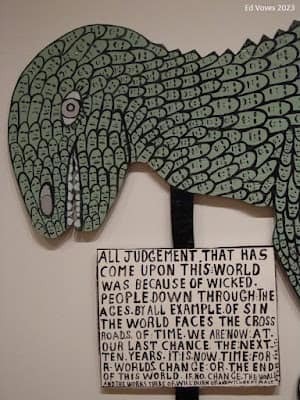
Howard Finster :: [Howard Finster's Paradise Garden]
* * * *
"The monsters had been the foes of the gods, the captains of men, and within Time the monsters would win. In the heroic siege and last defeat, men and gods alike had been imagined in the same host. Now the heroic figure, the men of old, remained and still fought on until defeat. For the monsters do not depart, whether the gods go or come."
-J.R.R. Tolkien
[— J. R. R. TOLKIEN, from “Beowulf: The Monsters and the Critics.”]
#Howard Finster#Howard Finster's Paradise Garden#about art#folk art#monsters#time#time and space#the hero's journey#Beowulf#literature
13 notes
·
View notes
Text
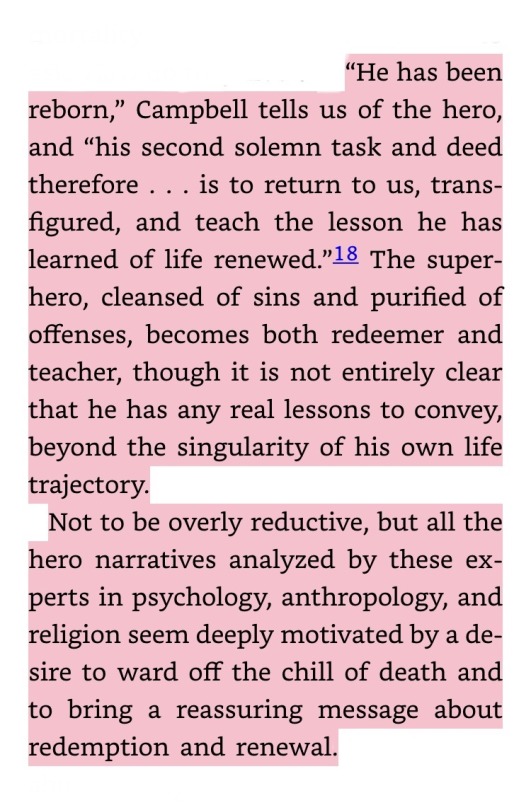
Maria Tatar was so real for this
#maria tatar#the heroine with a thousand and one faces#joseph campbell#the hero's journey#books#quotes#the heroine with 1001 faces
9 notes
·
View notes
Text
To people smarter than I am, what is the archetype of a Scarlet Witch-type character in mythology/literature? Is there an archetypal figure or name for a female character with these immensely powerful, reality-changing abilities who is unstable?
Because I keep seeing unstable yet powerful female characters like this (Scarlet Witch, Imogen from Critical Role, and Dark Phoenix, etc.), and I really want to know the mythic origins of this type of character. What is her arc and purpose in a narrative? Is she always a tragic heroine? Is she present in mythology? What is the purpose of her story?
Any thoughts on this would be great!
#mythology#scarlet witch#archetypes#meta#analysis#the heroine's journey#the hero's journey#myth#literary analysis
12 notes
·
View notes